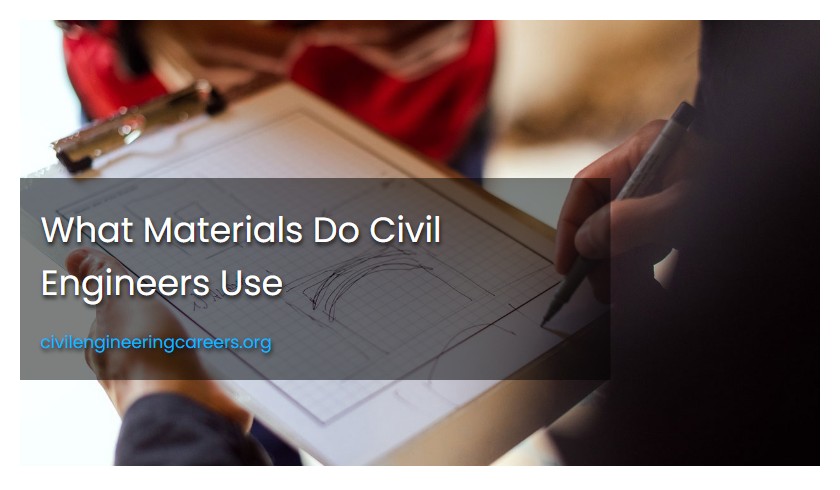What Materials Do Civil Engineers Use

Civil engineers deal with both traditional and modern construction materials. Traditional materials like timber, steel, asphalt, and Portland cement concrete are still frequently used in construction projects. However, modern materials such as polymers and composites are increasingly being utilized in the construction industry.
Civil engineering materials include both traditional and advanced materials. Traditional materials such as timber, steel, asphalt and Portland cement concrete are commonly used in construction projects. Along with these, modern materials such as polymers and composites are also being used in the industry.
What is civil engineering materials?
Civil engineering materials refer to the various substances and resources used in the construction of buildings, infrastructure, and other related structures. These materials are carefully selected, designed, and monitored by engineers and designers to ensure their suitability and effectiveness for the specific construction project.
What Types Of Equipment Are Used In Civil Construction?
Civil engineers use specialized equipment, including survey equipment, earth-moving equipment, heavy machinery, and other tools, to design and construct buildings and structures. These tools are essential to ensure the safety and efficiency of the structures they build.
What is the role of a civil engineer in construction?
The role of a civil engineer in construction involves dealing with traditional and advanced materials, including timber, steel, asphalt and Portland cement concrete, to ensure the successful completion of construction projects.
Civil engineers are required to work with both traditional and modern construction materials. Traditional materials like timber, steel, asphalt, and Portland cement concrete are commonly used in various construction projects. However, there is a growing trend of using advanced materials such as polymers and composites in the construction industry.
What courses do I need to be a civil engineer?
A civil engineering student typically takes courses in calculus, data analysis, soil mechanics, hydraulics, structural design and analysis, and mechanics of materials.
What makes a good civil engineer?
A good civil engineer has a well-rounded education that enables them to comprehend all aspects of a project, including mechanical, environmental, political, social, and artistic considerations. The top engineering schools do not always offer civil engineering programs.
What is the curriculum of civil engineering?
The curriculum of civil engineering typically covers courses in physics, mathematics, project management, design, and specific topics in civil engineering. Students begin with basic courses in various sub-disciplines before proceeding to specialize in one or more sub-disciplines at an advanced level.
Civil engineering materials encompass both traditional and modern materials used in construction projects. Traditional materials, including timber, steel, asphalt, and Portland cement concrete, remain prevalent, while modern materials like polymers and composites are gaining traction in the industry.
What are composites in civil engineering?
Composites in civil engineering refer to materials that consist of two or more components, bonded together as laminae or a matrix surrounding fibers or particles of another material. Examples include plywood, steel-reinforced concrete, and other types of composites.
What are examples of construction materials?
Construction materials are used to build structures and objects such as roads, buildings, bridges, and homes. Some examples of these materials include concrete, cement, soil, stones, aggregates, plastics, and asphalt.
Civil construction involves the use of various types of equipment. These include forklifts, excavators, cranes, hoist lifts, plate vibrators, trenchers, and dewatering pumps. Forklifts are essential for transporting heavy materials. Excavators help with digging and earthmoving. Cranes aid in lifting heavy items to considerable heights. Hoist lifts are used for vertical transportation. Plate vibrators are employed for soil and asphalt compaction. Trenchers dig trenches for pipelines and cables. Finally, dewatering pumps are used to remove water from construction sites.
What are the different types of construction equipment?
Construction equipment, also known as heavy machines, refers to a range of heavy vehicles and engineering equipment used during construction projects. There are various types of construction equipment, including excavators, bulldozers, backhoes, loaders, cranes, concrete mixers, and dump trucks. The proper use of these machines contributes to the economy, quality, safety, speed, and timely completion of construction projects.
What heavy equipment is used in construction site?
Various types of heavy equipment are used in the construction site, including excavators, bulldozers, loaders, backhoes, cranes, dump trucks, graders, pavers, compactor rollers, concrete mixers, scaffolding, drilling machines, tunneling equipment, and pile driving equipment. They all play a crucial role in performing various types of construction tasks effectively and efficiently.
Why is proper use of construction equipment important?
Proper use of construction equipment is essential for achieving economy, quality, safety, speed, and timely completion of any construction project. It is not always feasible for contractors to own every type of equipment needed for a project, but utilizing the appropriate equipment ensures efficiency and success.
The Civil Engineer is responsible for managing, designing and maintaining construction projects, conducting on-site investigations, analyzing data, assessing materials, costs and potential risks.
What is the role of Civil Engineers in construction?
Civil engineers play a crucial role in construction projects through crew management, worker and equipment safety, overall construction operations, and planning stages. Their expertise is essential for the effective completion of construction projects.
What is civil construction?
Civil construction is a branch of civil engineering that involves the construction and maintenance of civil engineering projects. It requires significant financial resources, equipment, and human capital to complete the projects.
How does construction engineering relate to the construction project?
Construction engineering is responsible for managing and keeping the construction project on schedule, ensuring that the construction plan is being followed and safety standards are met. It involves utilizing powerful project management tools and techniques to ensure that the project progresses smoothly and efficiently.
What is the future of Civil Engineers in construction?
The future of civil engineers in construction is promising, with opportunities for different roles in the industry. Civil engineers can work in both office and field settings, and most work full time even as contractors.





